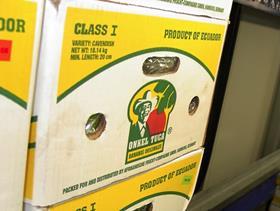
The European banana market has “shrunk” and become “very inaccessible to newcomers”, with falling consumption levels causing importers to cut excess volumes to a minimum and concentrate their resources on key clients.
This is the view of Bart Szatkowski, managing director of leading Polish banana importer-distributor Quiza, who told Eurofruit Magazine that the sector in Poland was currently experiencing a “year on year drop in consumption”.
“Due to big losses in the summer period of 2011, all banana importers and distributors in Europe have slowed down their businesses, focusing on core customers and reducing excess volumes to minimum,” he said.
As a result, Szatkowski believes the EU banana market has been “a bit undersupplied” in the last four months and Poland is no exception.
“We have not seen unexpected vessel arrivals and cheap fruit suddenly appearing on our market in big volumes,” he said. “This gives a little relief for all the trade, which I feel has no margin left for losses.”
Quiza, which is based in Gdynia on Poland’s Baltic coast, specialises in banana distribution in Poland and the Baltic states, importing an average of 600 tonnes of fruit every week.
Over the last 12 months, Szatkowski said banana distribution in Poland had become very regulated, partly due to the “incredible expansion” of international retail chains in the country, which had “completely changed” the market.
“Supplying a good quality product at the lowest price is not the only issue when it comes to cooperation with global retail chains – today, product safety, traceability and quality management standards are starting to play an important role,” he explained.
During 2012, Szatkowski said Quiza would be focusing on linking all its operations and procedures together in a single quality management system coherent with IFS and Tesco Food Management standards.
“We believe the direct sourcing of bananas from GlobalGAP certified producers in Ecuador combined with the rigid quality management system introduced by our company will allow us to maintain our position on the local market in front of increased quality demand from our customers,” he added.



